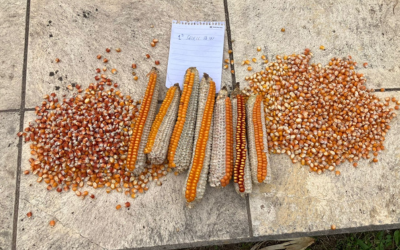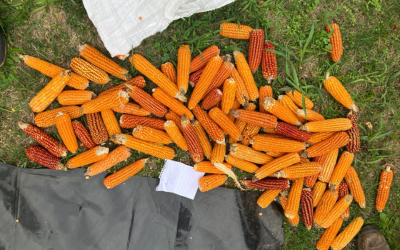As part of the Bioleft’s participatory breeding experiments, Enrico Cresta, an organic farmer and member of Bioleft, selects and develops his own open-pollinated (OPV) and GMO-free corn variety, adapted and improved to the organic conditions of his “Altos Verdes” establishment, located in the Cordoba province.
Video: Enrico Cresta, organic farmer: “We need circuits to develop our seeds”
Enrico has been dedicated to organic farmers for about 30 years, and in 2015 he started to select and develop his corn variety, adapted and improved under organic conditions and GMO-free. He departed from local materials derived from “Chucul” seed, developed by farmers like himself, freely crossed with hybrids and commercial varieties to increase the genetic variability and apply mass selection techniques. In 2018, he obtained a hard yellow corn OPV, which he named “Original”, but it was contaminated with GMO materials. Despite being detected in low value (nearly 1%), it had to be eliminated because it was not accepted in the organic approach.
In this post, we share the 2023/2024 season trial. Enrico´s trial consisted of a 25 m x 7m plot, planted in mid-October 2023, with a plant spacing of approximately 15 cm and a furrow spacing of 70cm. This distance ensured rapid furrow coverage and better weed competition, while it allowed mechanical weed control using a hoe. The early planting date was intended to offset the flowering of his corn with that of neighbouring corn to avoid contamination with pollen that might contain transgenic material in its composition. In addition, he planted near a mill, which allowed him to accompany the early stages of corn development with irrigation. To protect himself from birds without damaging them, the entire plot was protected by a net.
The presence of GMOs goes against organic farming principles, so materials in which GMOs are detected should be discarded. For this reason, all Enrico plants were evaluated before flowering. For the analysis, 10 samples were taken from a pool of 60 plants each. As an outcome of the tough work of de-transgenization, the result of the sample was 100% negative, and, with this information, Enrico ensured that his corn was free of OGM events.
In this video, Enrico shows us his trial and we can observe the state of his plants and general crop conditions.
With the support of his advisor and friend, the Eng. Germán Cravero, the best spikes of the plot were selected based on the following criteria:
- Good relative size, with an average weight of 120g
- A good number of rows, at least 14
- Low insertion in the plant, to reduce the likelihood of overturning
- Spikes of plants with good internal competition. That is, plants that stand out despite having limited resources due to their proximity to others, that are healthy, that compete well with weeds, that respond well to lack of water, etc.
- Healthy spikes. This means, those who neither present weevil or other pests or diseases.
The best spikes made up the 1° selection, that is, those that in relative terms best fit the selection criteria. The trial will be repeated in the following season, using these corns to continue the selection process while maintaining the GMO-free condition.

A second selection will be performed with those spikes coming from healthy plants, with good development and not affected by weevils, but which do not reach an average or acceptable size in relative terms. These seeds, together with the remaining ones, will be sown in field conditions for multiplication. The rest, small or diseased spikes, with weevils or coming from diseased or overturned plants, are part of the discard.

Here, it can be observed the trial visit and how the best spikes are determined. Once the selection is completed, Enrico will have valuable information in his search for corn adapted for organic production, reflecting the local and system conditions in which it will be used. Enrico plans to repeat this selection methodology and arrive at the 2025/2026 season with a GMO-free material 100% stable.
The results we share here are preliminary, as the 2023/2024 corn season hasn´t ended yet. When it is over, we will be able to process more robust information on the performance of Enrico´s corn.
In collaboration with Bioleft, farmers can enhance their knowledge and become breeders of their seeds. If you are interested in learning more about our participatory breeding experiments and want to know how to participate, don´t hesitate to write us at info@bioleft.org or any of our social media.